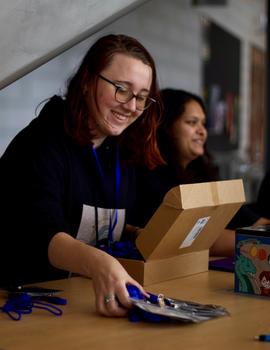
The project known as DataStorm: Ride the Legislative Change brought together dozens of George Mason University students from across multiple campuses and from an assortment of academic units for a three-day weekend in November. The goal? To create the first AI-enabled web tool that will track monetary penalties and gauge their impact on those who pay them.
The tool is called InsightLegi. When completed, the tool will track fines, fees, surcharges, and other penalties paid to public institutions—police departments, government agencies, and others—and will determine exactly where the money goes. It will also measure and report the impact on those who paid the fines.
Schar School of Policy and Government affiliate faculty member Tauheeda Yasin, who is leading the project, added that DataStorm will now involve participants from Mason’s NSF I-Corps Program, which brings George Mason into a community of fellow research institutions working to “push the boundaries of innovation, revolutionize industries, and leave a lasting mark on the world,” according to the website (which is here).
The DataStorm weekend attracted students from George Mason’s School of Computing; Department of Information Sciences and Technology; Criminology, Law, and Society; Government and International Politics (GVIP); and others.
“Participating in DataStorm represents an opportunity to bridge my interest in public policy with data-driven solutions,” said Sage Blake, a GVIP junior in the Schar School. “It’s empowering to see how technology and legislative change can intersect to create impactful solutions for communities. DataStorm was a steppingstone for myself on what I would like to do after I graduate.”
In addition to the hard science benefits, the Dallas, Texas, native gained leadership skills as one of the team leaders and project manager for the program.
“My primary responsibilities included organizing team collaboration, helping volunteers, keeping everyone on schedule, sending out confirmation emails, and outreach,” she said. “This experience has strengthened my skills in leadership, organization, and resourcefulness … Organizing this event allowed me to connect with incredibly talented individuals, enjoy flexibility in my schedule, and feel like I’m making a tangible difference in improving the world we live in.”
The DataStorm weekend was far from leisurely.
“My team faced challenges in communication and time limits to get everything sorted,” Blake said, adding, “The biggest surprise was realizing how crucial effective communication is in driving a team toward success. Collaboration is not just about dividing tasks—it’s about building trust and ensuring everyone is on the same page.”
In short, she said, “I’ve gained a deeper understanding of data analysis, teamwork, and how to develop solutions in a high-pressure environment. Working with peers from diverse academic backgrounds also taught me valuable problem-solving skills.”
The intense weekend in November will be followed up with a virtual hackathon taking place January 3-12. “Students can further their development of skills in data collection and analysis as well as earn badges for completion,” said Yasin. Registration for the next hackathon is on this page.
What Is the Purpose of DataStorm?
DataStorm and the resulting InsightLegi platform build on Yasin’s previous work and come on the heels of an October proof-of-concept hackathon. The goal of the effort, she said, “is to bring some transparency as to how the justice system funds itself so that we can create more efficient laws.
“Many people are unaware of how a $200 traffic fine can have a cascade of consequences for those unable to pay those penalties. Cyclical debt, loss of licensure, job loss, and incarceration are common occurrences for those who cannot afford their encounters with the legal system.
“There are profound impacts on not only the individual but their family and communities. Many people are unaware of their constitutional rights and also unaware of ways to help rectify issues when they are unable to pay. We hope this tool brings various stakeholders together to improve our justice system.”
